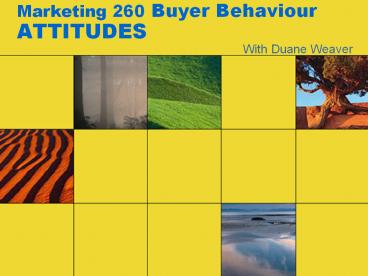Marketing 260 Buyer Behaviour ATTITUDES - PowerPoint PPT Presentation
Title:
Marketing 260 Buyer Behaviour ATTITUDES
Description:
ATTITUDES With Duane Weaver OUTLINE Attitude Defined Functional Theory ABC Model Forming Attitudes Attitude Models Predicting Behaviour Attitude Defined ATTITUDE ... – PowerPoint PPT presentation
Number of Views:89
Avg rating:3.0/5.0
Title: Marketing 260 Buyer Behaviour ATTITUDES
1
Marketing 260 Buyer BehaviourATTITUDES
- With Duane Weaver
2
OUTLINE
- Attitude Defined
- Functional Theory
- ABC Model
- Forming Attitudes
- Attitude Models
- Predicting Behaviour
3
Attitude Defined
- ATTITUDEa lasting, general evaluation of
people (including oneself), objects or issues. - Attitude Object anything toward which a person
has an attitude, albeit tangible or intangible
4
Functional Theory
- Attitudes exist because they serve some function
for the person determined by motives. - Utilitarian (reward punishment)
- Value-Expressive (enables outward expression of
self) - Ego-Defensive (protects from internal or external
feelings e.g. Marlboro Man machismo) - Knowledge (order, structure, and meaning)
- Ads relevant to the prevalent function prompt
favorable thoughts about product.
5
ABC Model
- Emphasizes interrelationships among knowing,
feeling, and doing. - Affect
- Feelings
- Behaviour
- Intention to do something with regard to an
attitude object - Cognition
- Beliefs about an attitude object
6
ABC Model
Hierarchy of Effects fixed sequence of events
occurs on the way to forming an attitude
How would we market to these different Attitude
formations? What form of advertising would you
use?
7
Forming Attitudes
- Classical Conditioning (pairing product with
repeated concepts) - Instrumental Conditioning (reinforcing value of
consumption) - Complex Cognitive Process
- IN YOUR TEAMS PROVIDE AN EXAMPLE of how you would
use the following theory/concept in your approach
to a market segment - Levels of Commitment Compliance (low),
Identification (medium), Internalization (high) - Consistency Principle (harmony) and Cognitive
Dissonance Theory (congruence) - Self-Perception Theory (rationalization?)
- Social Judgment Theory (social accpetance?)
- Balance Theory (Triad of attitude structures
persons perception, attitude object, other
person or object)
8
Attitude Models
- Multi-Attribute
- Assumes attitude of an attitude object depends on
persons beliefs about several or many attributes
of the object. - Attributes, Beliefs, and Importance Weights
- Fishbein Aijk ?BijkIik
- Where A Attitude, B Beliefs, and I
Importance Weight and i attribute, j brand,
k consumer - Provides computable Metric of
- Salient Beliefs
- Object-attribute linkages
- Evaluation of attributes
9
Predicting Behaviour
- Issues
- Low correlation between attitudes and behaviour
- Inability to act due to unexpected
circumstances(no banker available when want to
get a mortgage) ltltwasted marketing energyget
all the ducks in a row!! THIS IS MANAGEABLE! - Not all behaviour is intentional (impulse?!)
- Timeframe delay from time of attitude
measurement to expected behaviour (attitudes do
change over time) - Personal or environmental barriers between intent
and goal - Extending Fishbein with Theory of Reasoned Action
- Direction/degree or attitude (intensity)
- Social Pressure (use of engineered theatres)
- Attitude towards the actual act of buying
- Past purchase behaviour is better predictor
10
Predicting Behaviour
- Theory of Trying
- Past frequency
- Recency
- Evaluations of consequences
- The Process
- Expectations of Success or Failure
- Subjective norms towards trying
11
THANK YOU FOR YOUR TIME!































